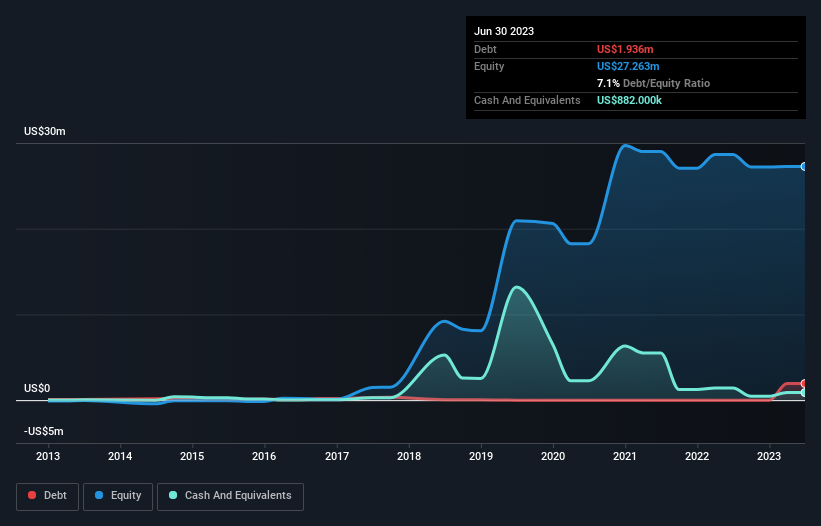David Iben put it well when he said, 'Volatility is not a risk we care about. What we care about is avoiding the permanent loss of capital.' So it might be obvious that you need to consider debt, when you think about how risky any given stock is, because too much debt can sink a company. We can see that Block Energy Plc (LON:BLOE) does use debt in its business. But the more important question is: how much risk is that debt creating?
Why Does Debt Bring Risk?
Debt assists a business until the business has trouble paying it off, either with new capital or with free cash flow. In the worst case scenario, a company can go bankrupt if it cannot pay its creditors. However, a more usual (but still expensive) situation is where a company must dilute shareholders at a cheap share price simply to get debt under control. By replacing dilution, though, debt can be an extremely good tool for businesses that need capital to invest in growth at high rates of return. The first thing to do when considering how much debt a business uses is to look at its cash and debt together.
View our latest analysis for Block Energy
What Is Block Energy's Debt?
The image below, which you can click on for greater detail, shows that at June 2023 Block Energy had debt of US$1.94m, up from none in one year. However, it also had US$882.0k in cash, and so its net debt is US$1.05m.

How Strong Is Block Energy's Balance Sheet?
Zooming in on the latest balance sheet data, we can see that Block Energy had liabilities of US$2.90m due within 12 months and liabilities of US$1.94m due beyond that. Offsetting these obligations, it had cash of US$882.0k as well as receivables valued at US$1.59m due within 12 months. So its liabilities outweigh the sum of its cash and (near-term) receivables by US$2.37m.
Block Energy has a market capitalization of US$9.10m, so it could very likely raise cash to ameliorate its balance sheet, if the need arose. But we definitely want to keep our eyes open to indications that its debt is bringing too much risk. There's no doubt that we learn most about debt from the balance sheet. But it is Block Energy's earnings that will influence how the balance sheet holds up in the future. So if you're keen to discover more about its earnings, it might be worth checking out this graph of its long term earnings trend.
In the last year Block Energy had a loss before interest and tax, and actually shrunk its revenue by 5.5%, to US$7.6m. That's not what we would hope to see.
Caveat Emptor
Over the last twelve months Block Energy produced an earnings before interest and tax (EBIT) loss. Indeed, it lost a very considerable US$2.5m at the EBIT level. Considering that alongside the liabilities mentioned above does not give us much confidence that company should be using so much debt. So we think its balance sheet is a little strained, though not beyond repair. However, it doesn't help that it burned through US$2.6m of cash over the last year. So in short it's a really risky stock. There's no doubt that we learn most about debt from the balance sheet. However, not all investment risk resides within the balance sheet - far from it. For instance, we've identified 4 warning signs for Block Energy (2 are a bit concerning) you should be aware of.
Of course, if you're the type of investor who prefers buying stocks without the burden of debt, then don't hesitate to discover our exclusive list of net cash growth stocks, today.
Valuation is complex, but we're here to simplify it.
Discover if Block Energy might be undervalued or overvalued with our detailed analysis, featuring fair value estimates, potential risks, dividends, insider trades, and its financial condition.
Access Free AnalysisHave feedback on this article? Concerned about the content? Get in touch with us directly. Alternatively, email editorial-team (at) simplywallst.com.
This article by Simply Wall St is general in nature. We provide commentary based on historical data and analyst forecasts only using an unbiased methodology and our articles are not intended to be financial advice. It does not constitute a recommendation to buy or sell any stock, and does not take account of your objectives, or your financial situation. We aim to bring you long-term focused analysis driven by fundamental data. Note that our analysis may not factor in the latest price-sensitive company announcements or qualitative material. Simply Wall St has no position in any stocks mentioned.
About AIM:BLOE
Block Energy
Explores for, develops, and produces oil and gas in the Republic of Georgia.
Excellent balance sheet with low risk.
Market Insights
Community Narratives


Recently Updated Narratives


No miracle in sight


Q3 Outlook modestly optimistic


Alphabet: The Under-appreciated Compounder Hiding in Plain Sight
Popular Narratives


The company that turned a verb into a global necessity and basically runs the modern internet, digital ads, smartphones, maps, and AI.


MicroVision will explode future revenue by 380.37% with a vision towards success



